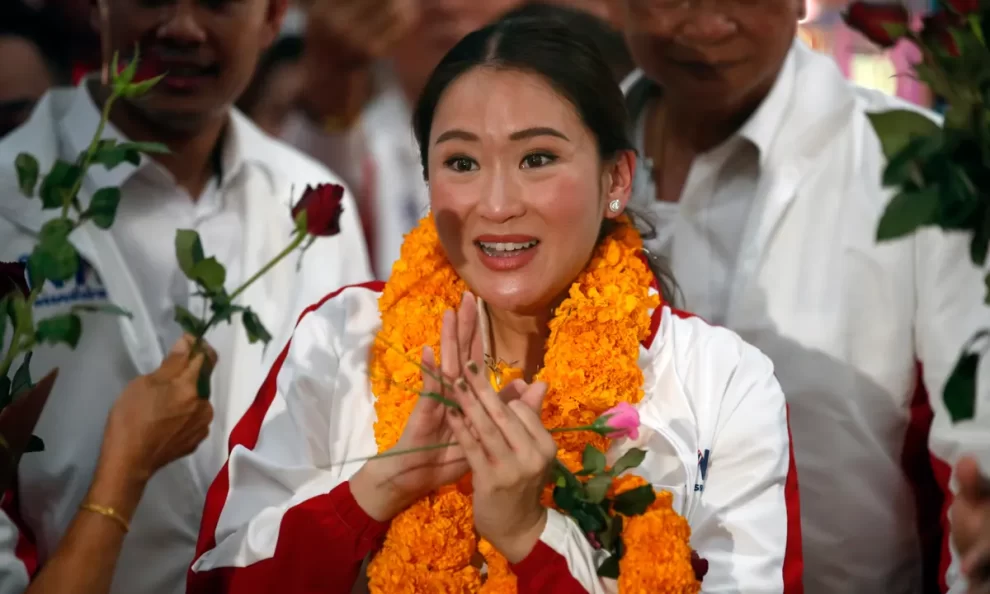As parliament dissolves, party of Paetongtarn, whose father was deposed in 2006, has best chance of forming majority
Thailand’s parliament has been dissolved, paving the way for an election in May that will pit military-linked candidates against the daughter of the former prime minister Thaksin Shinawatra.
King Maha Vajiralongkorn has endorsed a decree to dissolve parliament, according to an announcement in the Royal Gazette on Monday. An election must be held between 45 and 60 days after the house’s dissolution.
The Thai prime minister, Prayuth Chan-ocha, 68, who first came to power in a coup in 2014, will run for re-election under a new party, United Thai Nation. However, he is permitted to serve for only another two years before reaching the eight-year term limit, according to a ruling by the constitutional court. Prayuth is also trailing behind the opposition candidate, Paetongtarn Shinawatra, and her party, Pheu Thai, in the polls.
Paetongtarn, 36, who is expected to be nominated as Pheu Thai’s candidate, has said she is campaigning to win by a landslide. Parties associated with the billionaire Shinawatra family have won the most seats in every election since 2001.
They have also been ousted from power repeatedly; Paetongtarn’s aunt Yingluck was forced from office by a court ruling in 2014, and Paetongtarn’s father Thaksin was ousted by a military coup in 2006. Both Thaksin and Yingluck live in exile.
The family is loathed by the royalist military establishment, but remains incredibly popular in rural areas of the north and north-east.
Thaksin’s former party, Thai Rak Thai, was the “only party that credibly proposed policies and delivered on these policy promises in a way that concretely improved the wellbeing of people on a large scale,” said Napon Jatusripitak, a visiting fellow at the ISEAS-Yusof Ishak Institute in Singapore. “It has an enduring impact on people’s political preferences.”
Even if Pheu Thai performs well, however, the party may not be able to put forward a prime minister. “Pheu Thai is the only party that currently stands a credible chance of forming a majority in the house, but it happens to be the least likely to secure the support of the senate,” said Napon. Thailand’s 250 senators, who were appointed by the military, vote alongside the 500-member House of Representatives to select a prime minister.
The party would probably need to collaborate with existing political parties, whether these were in the current opposition or the ruling coalition, said Napon. This could involve a deal with the former army chief Prawit Wongsuwan, who was once a close ally of Prayuth but is running as the candidate of the ruling party, Palang Pracharath. Prawit, 77, has sought to pitch himself as a unity candidate who can bridge Thailand’s political divides.
Anutin Charnvirakul, 56, leader of the Bhumjaithai party and the current health minister, who championed the decriminalisation of marijuana last year, has also been cited by some analysts as a potential contender.
May’s elections will be the first to be held since youth-led mass protests in 2020 shook Thailand’s establishment by calling for the powers of the country’s monarchy to be curbed, and for the military-backed constitution to be rewritten.
The protests halted in 2021, as the authorities began to file legal charges including under the strict lese-majesty law, which carries a sentence of up to 15 years in prison. At least 1,890 people, including 284 young people under 18, have been charged under various laws.
Move Forward, the only party that has backed calls for reform of the lese-majesty law, has reportedly softened its rhetoric on the issue in the run-up to the election.
It was unclear what impact the election could have on young people if they felt their views were not represented, said Napon. “Does it produce the kind of political apathy as you see elsewhere? Or will it lead to extra-parliamentary-style politics, going out on the streets and more protests?”
Source: The Guardian


































